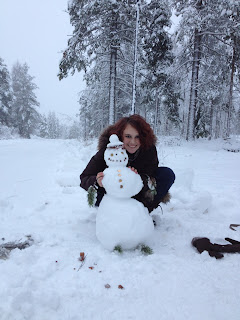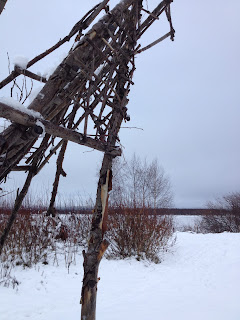First of all, this
piece is in no way a means of excusing the horrors that have been taking place
within Russia’s minority community throughout the duration of the past few
years. Neither is it a dismissal of some of the crueler policies Putin’s regime
has decided to unleash upon its people. I do not mean to justify any of the prejudiced
viewpoints held by a startling majority of the former USSR’s population, nor do
I aim to validate the violent acts of hate taking the country by storm. I am
simply an overly opinionated student with a Russian Studies major and a wish to
change the world.
A wish to make people
understand.
Even if we closed our
eyes and imagined that the Cold War hadn’t happened, it is doubtful that the
world would be going into Sochi with an open-minded, happy go lucky attitude. Russia,
with its increasingly oppressive anti-gay laws, skyrocketing levels of racism and
homophobia, and hopelessly corrupt political system, is enraging—and, frankly, quite
confusing—to the majority of us. As a country, it stands as the sixth most
powerful territory in the world; it is one of five permanent members of the
United Nations, giving it almost infinite power over any UN resolution; and it
is home to the highest number of the world’s billionaires.
Why, then, it is so
much more “backward” than any of the other “developed” countries we hold in
such high regard?
To put it simply,
despite its being grouped with other “first world” countries, it is not like
us; we evaluate the status of its economics, but neglect to take into account
the underlying factors that have hindered its path to modern social progressiveness.
For years, it existed under Mongolian rule; while the bulk of Europe
experienced the enlightenment of the Renaissance, Russia continued to sit in
the dark. Years later, Stalin rose to power.
Many of us have been
taught to despise communism; for generations, it has represented the enemy of freedom,
the disease that takes hold of a country and, if left unchecked, spreads to all
surrounding territories with weak, nondemocratic governments that cannot fight
the virus. While we occupied ourselves with the supposed threat to America’s
people, however, we neglected to see what Stalin did to his own. Newspapers
were censored; books were destroyed; valuable information was withheld from the
public, replaced by an idealized fabrication that romanticized the Soviet
lifestyle and stifled independent thought. Large groups of people were crowded
into apartments built to fit a single family. Scientists, geniuses, radicals,
philosophers, high-level officers—some of the country’s most progressive, intelligent
people—were killed in a matter of years. Those who spoke out or threatened the
government’s stability were brutally arrested; the only options were to keep your
head down or run the risk of starving or freezing to death in a Siberian Gulag.
By the time the Soviet regime fell, the only ones left were those figuratively
(and, often literally) beaten into submission by a government that punished
free speech and independent thought; now, they struggle to adapt to a democracy
in which their opinions do not matter—in which their leader is more dictator
than Guidant.
Today, especially in
light of the upcoming Olympics, international media has a significant tendency to
scrutinize Russia with a particularly critical eye: they are portrayed as rude,
homophobic nationalists, who would rather murder their stray dogs than help
them seek shelter. Now, I’m not saying that none of this is true—racism,
homophobia, and a unique brand of nationalism run high in Russian citizens; rather,
I am asking you to understand them before you classify the entire lot of them—or,
for that matter, their culture—as ignorant or cruel. Living in Russia, one of the
most prominent impressions I received was not one of hatred, but of despair—a sentiment
that fighting for one’s rights is pointless, especially in a society where
votes and voices are squashed by overwhelming corruption. Poverty is rampant;
many men drink not only to escape the daily grind of a repetitive, low-paying job,
but because vodka is less expensive than a good coat. The (somewhat hilarious)
inconveniences that journalists are all a-twitter about are far more luxurious
than many of the Soviet-style apartments most Russians inhabit.
One of the most
heart-breaking moments of my experience in St. Petersburg occurred when I was
leading an adult English discussion group, a weekly requirement for my
under-the-table part-time job I had managed to fish out to provide me with some
extra spending money. Midway through the presentation (the topic happened to be
American politics and the US election system,) one of the audience members
raised his hand and politely asked if we could move on—in a world where votes
literally did not count, learning about a democracy that functioned more or
less effectively was, to put it simply, depressing.
Many Russians do not
like Putin; in fact, had the ballots been counted truthfully, it is improbable
that he would even be president today. Another member of the group later chimed
in and added that, having met failure after failure in trying to make his new
democracy work, he, along with most of his friends and acquaintances, had given
up; it was easier to believe in nothing than to fight for demands that would
not be acknowledged and exist in a state of constant disappointment. Now, I am
not at all saying that this excuses them from vying for the human rights that
have been so consistently denied to Russia’s minority groups, and I am by no
means of the conviction that their hatred is justified. I mourn for those who
suffer from the injustices Putin has inflicted upon them, and my heart breaks a
little more each time a new LGBT member is beaten or hurt by a member of an
activist party—not only because I so badly want justice for them, but also because the image
that depicts Russia as a hateful, ruthless, brutal country is burned further and
further into our brains. The fact is that Russia, although in many ways socially behind
(some compare it to the United States in the 50’s and 60’s,) is truly a
beautiful country. Its people, although exhausted, are unbelievably kind,
hospitable to a fault, and perhaps more brilliantly wise than many could ever
hope to be.
Of course, I do not
expect everybody to love, or even like, Russia, and frankly, not everyone is cut
out for it. The weather is harsh; the water is undrinkable; the meat, no matter
what the variety, will be almost always be labeled simply as “meat;” and in
taking an elevator, there is about a 20% chance that you will break down and wait
from five minutes to three hours for a mechanic to fix the problem long enough for
the elevator to take you to your desired floor. I am also not saying that
people should ignore what is happening. I am glad for the international
scrutiny—it provides a voice, however small, for people who are typically
ignored or stifled by government officials, and I do believe that world
pressure has the power to inspire (or force) a great deal of change. I am merely
asking you to understand before labeling a nation of people, and to have faith
in them. They may have a great way to go, but if no one believes in their ability to do so, they will
never have the opportunity to make the journey.























































